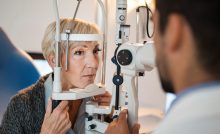Polarized vs. Photochromic Lenses: How Are They Different?


People with nearsightedness, farsightedness, astigmatism and other refractive errors often need prescription glasses. Knowing your lens options is essential if you are among these individuals. Photochromic and polarized lenses are ideal for those who wish to optimize their vision in different lighting conditions. Keep reading to learn the difference between them.


Polarized Lenses
Polarized lenses reduce glare from surfaces like water, snow and roads. They contain a special filter that blocks intense reflected light, improving visual clarity and reducing eye strain. These lenses can significantly decrease glare, making them ideal for outdoor activities like driving, fishing and skiing. However, polarized lenses remain the same shade regardless of lighting conditions.
Photochromic Lenses
Photochromic lenses automatically adjust their darkness in response to UV light exposure. They are clear indoors and darken in bright sunlight, providing a seamless transition between environments. The primary advantage of photochromic lenses is their convenience and adaptability. They eliminate the need to switch between prescription eyeglasses and sunglasses.
A Quick Comparison
Application
Polarized and photochromic lenses serve different purposes. Individuals who spend plenty of time outdoors or driving in sunny conditions will benefit from the glare-diminishing capabilities of polarized lenses. On the other hand, you should consider photochromic lenses if you swap between indoor and outdoor settings throughout the day. These lenses offer a practical all-in-one solution for eye protection against UV light and glare.
UV Protection
While photochromic lenses provide complete protection from UV rays, polarized lenses don’t. However, you can get UV-blocking polarized sunglasses.
Cost
Photochromic lenses often have a higher price tag than their polarized counterparts. It’s mainly due to the advanced technology required for their adaptive tint.
Are you unsure which eyewear suits your needs? Find the perfect fit with Vienna Eyecare Center. We’re here to help you make the best decision for your eyes and vision. Call us at (703) 938-7633 or complete our online form to schedule an appointment.
Recent Posts
How Stress and Your Mental Well-Being Can Impact Vision
In the bustling and picturesque city of Vienna, VA, Vienna Eyecare Center stands as a…
What You Need to Know About Dilated Eye Exams
Eye health is an essential aspect of your overall wellness, often overlooked until a problem…
Does Nearsightedness or Farsightedness Improve with Age?
Understanding the nuances of eye health, particularly how conditions like nearsightedness and farsightedness evolve with…
Are Thin High-Index Lenses Worth the Extra Money?
When it comes to choosing eyewear, particularly for those of us with strong prescriptions, we…
Signs It’s Time to Schedule Your Next Eye Appointment
Maintaining optimal eye health is crucial, not only for clear vision but also for overall…
Is Untreated Myopia Dangerous?
Myopia, commonly known as nearsightedness, is a prevalent vision condition that affects a significant portion…







